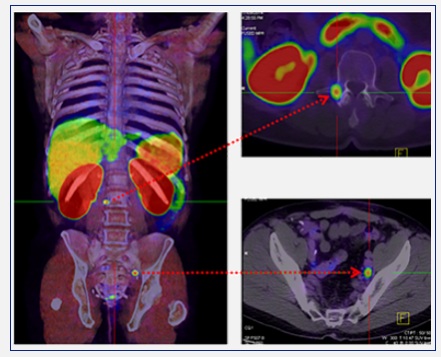An introduction to PET-CT scans

Patient Information
Positron emission tomography–computed tomography (PET-CT) is a global best practice diagnostic imaging tool that captures three-dimensional images of the body's biological functions. By utilising a small amount of a radiotracer (a radioactive substance that is used in medical imaging*), PET-CT scans can detect areas of abnormal metabolism or function in the body, including fast-growing cancers and infections.
PET-CT scans help doctors pinpoint the location of tumours or cancerous lesions, assess the extent of disease, determine whether lesions are benign or malignant, and identify any potential spread.
PET-CT provides oncologists with accurate information on the extent and severity of disease which enables them to better plan a patients cancer management and treatment, avoiding over or undertreatment, and potentially improving patient outcomes.
*Radiotracers are administered in controlled doses and do not contain dangerous levels of radioactive substances
When are PET-CT scans used?
PET-CT scans are commonly used for, but not limited to:
- Prostate cancer
- Lymphoma
- Breast cancer
- Melanoma
- Lung cancer
- Colon cancer
- Cervical cancer
- Head and Neck cancer
- Ovarian cancer

What are the benefits of a PET-CT scan?

How to access a PET-CT
To get a PET-CT scan, consult your physician or oncologist for a referral. If you have medical aid, make sure to obtain an authorisation number ahead of the scan.
What does the procedure involve?

What happens next?
The report will be shared with your Oncologist within one to three days. They will then discuss the results with you.
The PET-CT images

This information is brought to you by Life Healthcare in the interest of moving cancer care forward.
The information is shared on condition that readers will make their own determination, including seeking advice from a healthcare professional. E&OE. Life Healthcare Group Ltd does not accept any responsibility for any loss or damage suffered by the reader as a result of the information provided.

